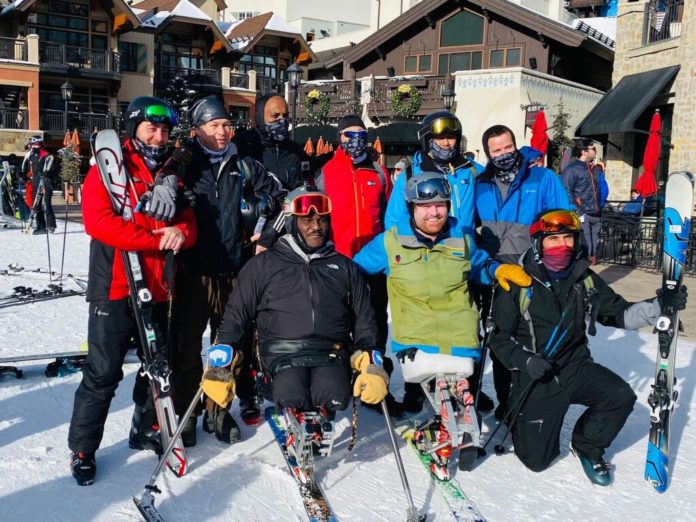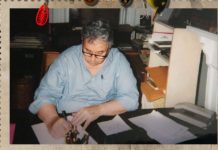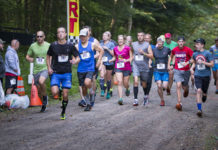Vail Veterans Program/courtesy photo
Those who have been invited to Vail Veterans Program events say those programs have changed their lives. Now that life-changing mountain therapy is reaching out to other veterans from other countries.
The program this week has welcomed a group of seven veterans of the Israeli Defense Force. Those veterans are supported by Brothers for Life, an Israeli group with much the same mission as the Vail Veterans Program — providing injured veterans with support and respite from their day-to-day lives.
A Tuesday reception at Larkspur restaurant welcomed the seven Israelis, along with a couple of Vail Veterans Program participants and a number of local supporters.
During the event, attendees listened intently to Imad Bader of Israel and Vail Veterans Program participants Greg Gasdon and Andrew Kinard. Both men lost their legs in combat in Iraq. Bader told the group he’s dealing with post traumatic stress disorder, or PTSD, stemming from a 2010 incident near the Western Wall in Jerusalem that found him nearly killed by an angry mob while trying to arrest two men about to throw incendiary devices.
Bader, 40, said he’s still on active duty with the Israeli Defense Force, thanks to the work of Brothers For Life.
“It changed my life, it (brought) my life back to life,” Bader said. “My wife said ‘you’ve returned to the same person.’”
More than physical wounds
In interviews before they spoke, Gadson and Kinard both said the same thing about the Vail Vail Veterans Program: “It changed my life.”
Gadson, a former U.S. Army officer, said he took his first trip to Vail in summer of 2007, just months after being wounded in Iraq, and losing both legs. He’s been back nearly every year since.
Vail Veterans Program/courtesy photo
Gadson noted that a “core premise” of the program is healing, not just for service members, but their families, too.
“The whole family was wounded,” Gadson said. After several days of horseback riding, fly-fishing and other activities, the Gadsons left the valley with a different outlook on life.
“We left here understanding, and knowing, we were going to have to do things differently, but we were going to do it,” Gadson said. “I did every single thing I’d have done if I’d had my legs.”
Valley resident Pete Thompson, a Vietnam-era Army veteran, noted that Gadson now is a “speed demon” on the slopes.
“Speed limits are for…” Gadson said, trailing off, seemingly to avoid language more appropriate for a barracks.
“When I’m on those skis I’m just like everybody else,” Gadson said. “I’m unconstrained… and as physically rewarding as it is, it’s exponentially more emotionally rejuvenating.”
It took a few years for Kinard to come to the Vail Valley.
A former U.S. Marine, Kinard also lost his legs in Iraq. Working on Wall Street after his injury, Kinard kept hearing about the freedom skiing can provide. After reaching out to his connections at Walter Reed National Military Medical Center, he participated in his first Vail Veterans Program week in 2015.
“It’s sublime,” Kinard said of skiing, noting that all the everyday obstacles of stairs and curbs disappear on the snow. Skiing is also a very social activity, he added. “It was the first time I’d been able to do an activity with my friends,” he said. Success on the slopes also drove a desire for even more independence. Kinard these days can get from his car to the lift to the slopes without assistance.
A drive to stay upright
It didn’t take long for Kinard to quit his job on Wall Street and spend a winter as a ski bum. Now living in California, Kinard is now a ski instructor, and spent all day Monday with an Israeli veteran who’s also in a wheelchair.
There was a lot of falling, and there will be more falling this week. But, Kinard added, “folks in the military tend to be very competitive… I could see it in his eyes… and I wanted to continue to support that.”
Bringing a group from Israel began in 2019, and has restarted this year.
Dr. Matt Provencher and Cordillera resident Steven Wellins both had a hand in opening up the program.
Provencher, a retired U.S. Navy surgeon still in active practice, was working at a hospital in Boston when a fellow doctor approached him to help care for “wounded warrior athletes.” Provencher at one time was one of the surgeons who helped care for the New England Patriots, so he’s familiar with orthopedic injuries.
After moving full-time to Vail a few years ago, Provencher met Vail Veterans Program founder Cheryl Jensen, and learned about the efforts to bring Israeli veterans to the Vail Valley.
Wellins also learned of the idea through a talk with Jensen.
“I reached out to a lot of friends, and we helped raise the money to bring that first group in 2019,” Wellins said. Those friends helped organize the current trip.
Wellins noted that Israeli and U.S. military people are close-knit, and largely believe in the same things regarding democracy and freedom.
And, like most soldiers, the veterans gathered Tuesday said they’d serve again.
Speaking to the group at Tuesday’s reception, Gadson said he and Kinard would do it all again.
“Well, I’d have stepped left, and not right,” Kinard said.
For more information, go to VailVeteransProgram.org or BrothersForLife.com.
Credit: Source link































